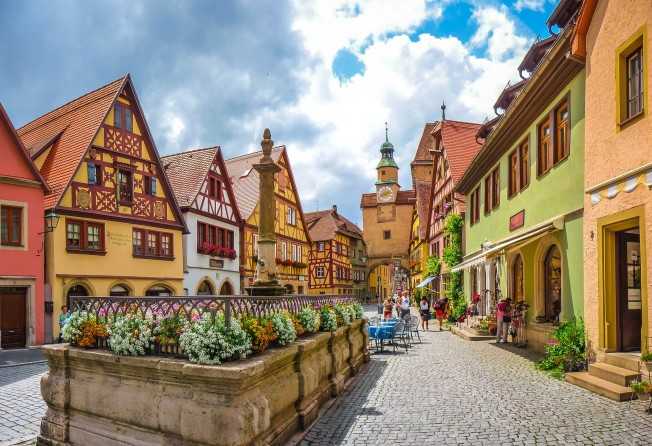Oktoberfest in China? Developer woos businesses with a replica German city in Hengqin near Macau
- Hengqin German City has engaged Siemens to set up base and study the feasibility of an electric car venture
- Developer seeks to retain half of the properties to ensure its sustainability as sales are temporarily halted amid coronavirus outbreak

A replica German city is taking off in Hengqin near Macau, targeting overseas investors seeking a beachhead in China’s new economic hub in the Greater Bay Area.
Hong Kong-listed developer TFG International is spending 1.6 billion yuan (US$229 million) to build the project known as Hengqin German City on a 60,400 square metre site on an island south of Zhuhai in Guangdong province. The island is connected to Macau, the world’s biggest gambling hub, by the 1.76km Lotus Bridge.
The city will feature a main street replete with German architecture, with shops offering German food, beer, medical services and a hi-tech business centre, the developer said. There will be 1,100 office units in four high-rise towers, a 120-room hotel and an international exhibition centre when the development is completed in 2021.
“The project can serve as an alternative for German firms entering the GBA,” said Albert Yu Shun-hui, co-chairman of TFG. “It will target more than 500 German firms, or companies in Hong Kong and Macau involved in German technology and business, to set up offices there.”
TFG has generated 230 million yuan from the sale of 200 office units when it launched the first round of sale last November, Yu added. The second round of sale has been suspended because of the coronavirus outbreak that has prompted the local government to close all casinos for two weeks from February 4.
Yu, who is based in Hong Kong, said Siemens has agreed to set up a base in the project to study feasibility of the location for making electric cars to cater to the Chinese market. Tesla rolled out its first Made-in-China electric cars from its US$5 billion plant in Lingang near Shanghai last month.
“We are also in talks with Siemens to team up with University of Macau to provide learning courses for students,” he added. “This is not just a property project. It will also help promote education and tourism.”
The Greater Bay Area represents China’s economic blueprint to link nine Chinese cities in the Pearl River Delta with Macau and Hong Kong, and turn them into a new financial and business hub to rival San Francisco and Tokyo. The cluster made up about one-eighth of China’s economy in 2017, with a population larger than the UK and twice that of Canada.
TFG owns a 70 per cent stake in the venture, while the other 30 per cent is held by Tony Un Chong San, chairman of the German Macau Business Association.
The German-themed city adds to some 1,000 towns across mainland China that replicate certain European cities. The Sky City in Hangzhou, Zhejiang province features Parisian architecture and a 108-metre tall replica of the Eiffel Tower, while the Austrian village of Hallstatt was reconstructed in Huizhou in Guangdong province. A copy of Stratford-upon-Avon, Shakespeare’s birthplace, is due in 2022 in Fuzhou in Jiangxi province.
For Hengqin German City, Yu said the developer will only sell half of the properties, and retain and manage the balance in its books to ensure its long-term sustainability. He is confident sales can increase when the coronavirus outbreak comes under control.
“The viral outbreak will only be a short-term hiccup,” he said. “Things will return to normal once the epidemic is contained. The suspension of sales is also for the safety of our staff.”